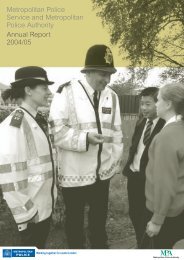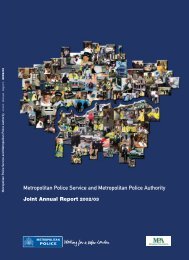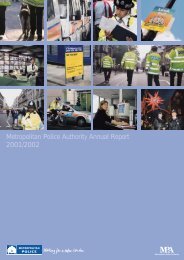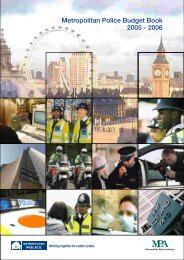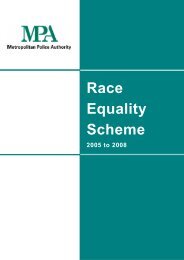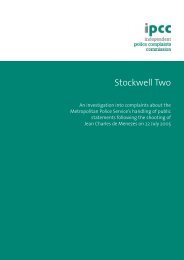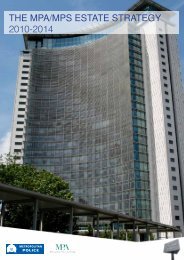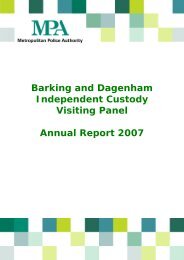Final Report of the Morris Inquiry: The Case for Change
Final Report of the Morris Inquiry: The Case for Change
Final Report of the Morris Inquiry: The Case for Change
You also want an ePaper? Increase the reach of your titles
YUMPU automatically turns print PDFs into web optimized ePapers that Google loves.
THE CASE FOR CHANGE<br />
process without <strong>the</strong> concern that discussions will be referred to in any subsequent<br />
employment tribunal proceedings.”<br />
4.107 We can see some advantage in a ‘no notes’ procedure in relation to<br />
mediation discussions but we can also see disadvantages with disputes over who<br />
said what occurring later in <strong>the</strong> Employment Tribunal. We think that it should be<br />
left to <strong>the</strong> parties to <strong>the</strong> particular mediation to agree a ‘no notes’ procedure if <strong>the</strong>y<br />
consider it appropriate.<br />
4.108 We do, however, consider that <strong>the</strong>re would be an advantage in extending <strong>the</strong><br />
protection under <strong>the</strong> Employment Tribunals Act 1996 <strong>for</strong>mally to mediation discussions.<br />
We recommend that <strong>the</strong> Department <strong>of</strong> Trade and Industry gives<br />
consideration to a specific provision extending <strong>the</strong> protection af<strong>for</strong>ded to<br />
discussions involving ACAS to discussions that take place between <strong>the</strong> parties<br />
at a mediation so that <strong>the</strong> discussions become privileged.<br />
Ombudsman<br />
4.109 It has also been suggested that <strong>the</strong> grievance procedure would benefit from<br />
<strong>the</strong> referral <strong>of</strong> issues not capable <strong>of</strong> early resolution “to an outside body, independent<br />
<strong>of</strong> <strong>the</strong> Service, <strong>for</strong> swift resolution by ei<strong>the</strong>r mediation or a determination binding on both <strong>the</strong><br />
complainant and <strong>the</strong> person complained against.”<br />
(Submission from <strong>the</strong> Commissioner, Sir John Stevens)<br />
4.110 <strong>The</strong> MBPA argues <strong>for</strong> <strong>the</strong> introduction <strong>of</strong> an ‘ombudsperson’ and suggests<br />
that he or she would receive referrals from <strong>the</strong> FAW Co-ordinator during or after <strong>the</strong><br />
FAW procedure. <strong>The</strong> ombudsperson would complete a report with recommendations<br />
and this will be made available to <strong>the</strong> Co-ordinator and his or her team. It would also<br />
be available to <strong>the</strong> parties but only after <strong>the</strong> FAW procedure has been concluded.<br />
4.111 <strong>The</strong> MBPA does not believe that <strong>the</strong> majority <strong>of</strong> cases would be referred to<br />
<strong>the</strong> ombudsperson but only exceptional cases. No party would be obliged to follow<br />
his or her recommendations.<br />
4.112 <strong>The</strong> argument seems to be that, by going outside <strong>the</strong> MPS, to an<br />
ombudsman figure, <strong>the</strong> parties would be involving an independent person who<br />
could recommend a resolution.<br />
4.113 Mr Hogan-Howe suggested such an arrangement to deal with <strong>the</strong><br />
perception <strong>of</strong> a lack <strong>of</strong> independence in FAW:<br />
“This could be overcome by augmenting <strong>the</strong> standard Fairness at Work arrangements with <strong>the</strong><br />
potential <strong>for</strong> referral to ei<strong>the</strong>r an external figure such as an ombudsman or a recognised<br />
90


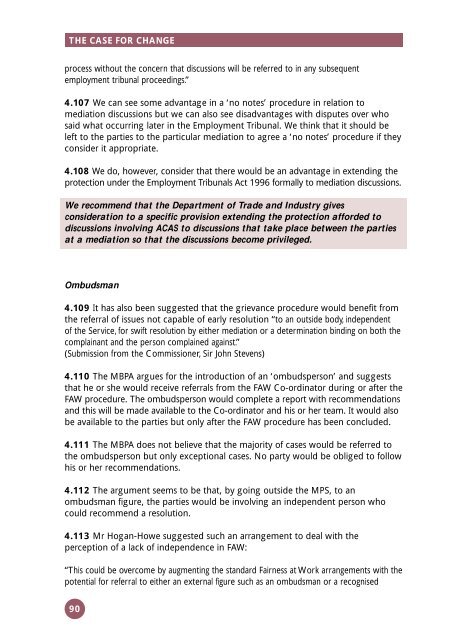
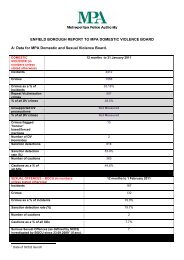
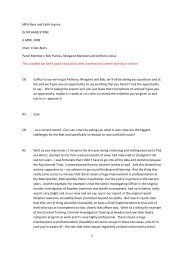
![Appendix 1 [PDF]](https://img.yumpu.com/51078997/1/184x260/appendix-1-pdf.jpg?quality=85)
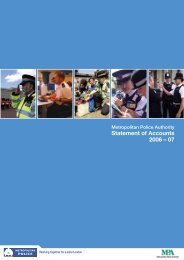
![Transcript of this meeting [PDF]](https://img.yumpu.com/50087310/1/184x260/transcript-of-this-meeting-pdf.jpg?quality=85)
![Street drinking in Hounslow [PDF]](https://img.yumpu.com/49411456/1/184x260/street-drinking-in-hounslow-pdf.jpg?quality=85)
